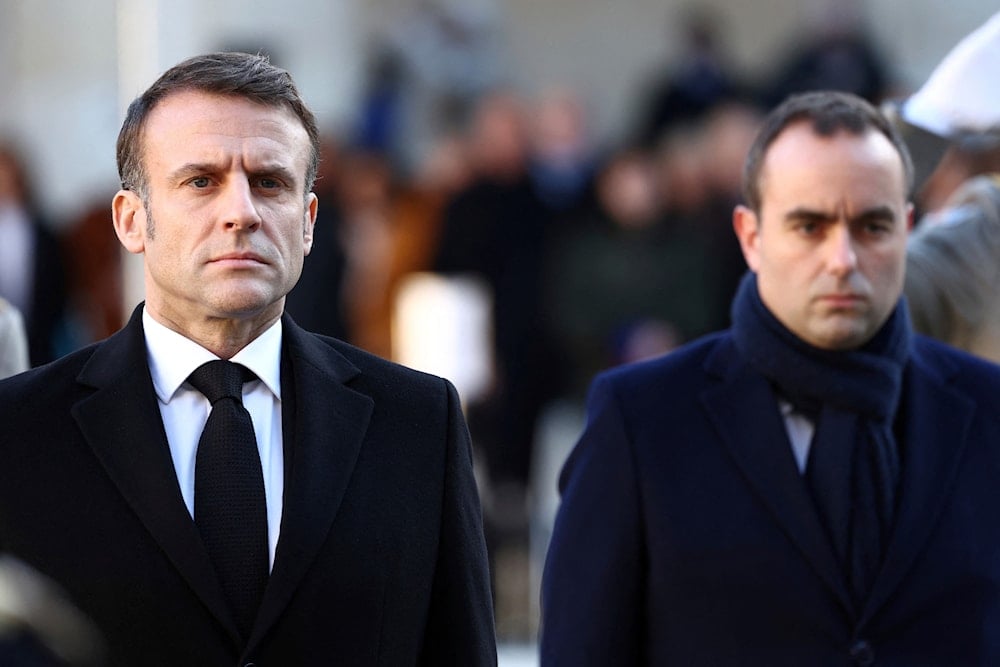France's Macron to again name PM to break political deadlock
Emmanuel Macron again faces a political crisis after Sebastien Lecornu's resignation, and a new French prime minister is expected as Macron struggles to break a government deadlock.
-

French President Emmanuel Macron and then-French Defense Minister Sebastien Lecornu attend a ceremony for late French politician and former European Commission President Jacques Delors in the courtyard of the Hotel des Invalides in Paris, on January 5, 2024. (AP)
French President Emmanuel Macron is expected to name a new prime minister by Friday evening, as the France political crisis of 2025 intensifies following the resignation of Sébastien Lecornu. The move is seen as an attempt to avoid snap elections and resolve a deepening governmental deadlock that has plagued Macron’s second term.
The president convened a meeting with leaders of all major parties on Friday, excluding Marine Le Pen’s far-right National Rally (RN) and the far-left France Unbowed, in a bid to rally support for a new head of government capable of steering the country out of political paralysis.
Macron’s gamble on snap elections last year backfired, leaving parliament fractured and emboldening both the far-right and the Left. Lecornu, Macron’s seventh prime minister, announced his resignation on Monday after months of gridlock, particularly over a contentious austerity budget.
Despite unveiling a new cabinet earlier in the week, Lecornu faced criticism for failing to signal any meaningful departure from Macron’s previous administrations. On Wednesday, he said he was hopeful a revised budget could still pass, and agreed to remain in office temporarily to facilitate discussions with party leaders.
Who could be France’s next PM?
As speculation mounts, several names have emerged as potential successors. Former minister Jean-Louis Borloo, who served under Jacques Chirac and Nicolas Sarkozy, was mentioned as a possible candidate. However, Borloo dismissed the speculation, stating on Thursday that he had received “zero” contact from the president’s office.
Other potential contenders include Pierre Moscovici, head of France’s supreme audit institution and a former Socialist minister, and Bernard Cazeneuve, another Socialist and former prime minister. Both are seen as figures who could lend technocratic credibility amid the fiscal crisis.
Lecornu himself did not indicate a preferred successor and did not rule out the possibility of being reappointed, a move that would likely provoke further opposition and raise the risk of a no-confidence vote. He also suggested a technocratic government, whose members would not run in the 2027 French presidential elections, could be a viable way forward to ensure political neutrality and short-term functionality.
Le Pen’s national rally vows to block new Government
Marine Le Pen, whose anti-immigration National Rally is expected to make significant gains in 2027, has vowed to obstruct any incoming government. “We will vote against everything,” she declared earlier this week.
Le Pen, disqualified from running following a corruption conviction, has endorsed her 30-year-old deputy, Jordan Bardella, as a potential candidate in the upcoming elections.
The latest crisis marks one of the most turbulent periods of Macron’s presidency since he took office in 2017. Former Prime Minister Edouard Philippe, now a likely contender for 2027, openly criticized Macron’s leadership and called for him to resign once a budget is passed, a demand Macron has rejected.
With the deadline to present a 2026 budget fast approaching, Macron faces pressure to appoint a new prime minister and cabinet before the end of the weekend.

 3 Min Read
3 Min Read








